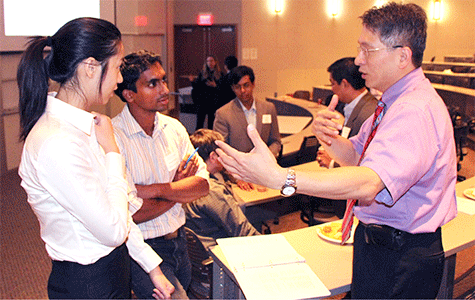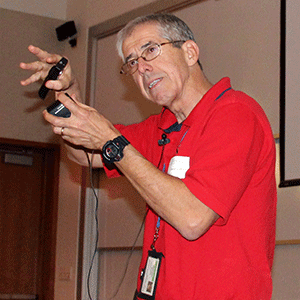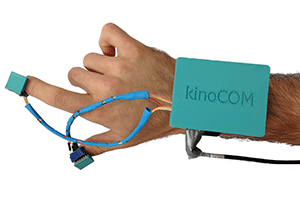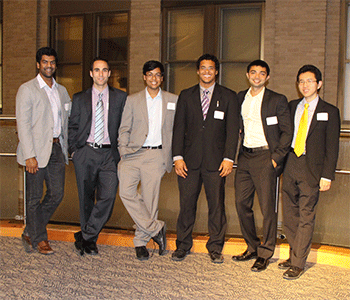
One doctor wants a better chair to position patients during lumbar puncture procedures. Another wants a more accurate tool for small bowel exploration. And another wants to access patients’ medical information with the swipe of a card.
These were among about 20 ideas presented by faculty during IDEA Labs’ inaugural “Problem Day” Oct. 11 in hopes that the 83 undergraduate, medical and graduate students who attended might be able to devise solutions.
IDEA Labs is a bioengineering design incubator founded last fall at Washington University in St. Louis as a joint venture of the schools of Medicine and Engineering & Applied Science and the Division of Biology and Biomedical Sciences (DBBS). The program’s goal is to tackle unmet needs in health-care delivery and clinical medicine by fostering collaboration between students and faculty.
The inspiration for IDEA Labs, which stands for Innovation, Design and Engineering in Action, came to the program’s president, MD/PhD student Avik Som. Som was inspired by a patient with amyotrophic lateral sclerosis (ALS, also known as Lou Gehrig’s disease) who visited his physiology class last year. The patient was almost completely paralyzed and used an eye tracker to communicate through a computer.
The experience had an impact on Som, who later spoke with fellow MD/PhD student Ravi Chacko, now an IDEA Labs board member and team leader, about how they could improve the patient’s ability to communicate with better technology.

(Credit: Allison Braun)
Unsure of where to start or how to fund the ambitious project, the students put their idea on hold until weeks later, when Som met Feliciano “Pele” B. Yu Jr., MD, associate professor of pediatrics.
Yu, who also is chief medical information officer at St. Louis Children’s Hospital and director of the Washington University Pediatric Computing Facility, told one of Som’s classes that physicians identify shortcomings in medical technology and inefficiencies in health care but often lack the time or expertise to address them.
Som approached Yu, who is also a scholar at the university’s Institute for Public Health, about starting a student group to address the types of situations Yu had described. Yu thought it was a great idea and agreed to serve as a mentor.
“Our goal was to take physicians who know the problems and students and faculty on both campuses who have the skills to solve them, and put them together,” Som said.
Building interest
Som began pitching the idea to friends and classmates and found interested students on the Medical and Danforth campuses.
“We knew from our collective past experiences that medical and engineering students working side by side could learn and accomplish much more than either alone,” said medical student Sam Sun, IDEA Labs’ managing director.
After consulting with faculty from their respective areas of study and the university’s Skandalaris Center for Entrepreneurial Studies, the student leaders launched IDEA Labs with eight teams, each of which designed a novel medical device.
Faculty members, including Jay F. Piccirillo, MD, vice chairman for research in the Department of Otolaryngology; Melvin Blanchard, MD, associate professor of medicine; and Joe Klaesner, PhD, research associate professor of physical therapy and radiology and adjunct associate professor in biomedical engineering, have been vital contributors to IDEA Labs. Members of the university’s BioEntrepreneurship Core, a networking organization that connects student and faculty scientists with entrepreneurs, also have volunteered to advise teams during the design process.
In-class design teams, like those in the Department of Biomedical Engineering, take about one year to complete a prototype. However, in IDEA Labs, most teams produce a prototype within two months, often with live demos.

One of those inventions was KinoCOM, a kinetic communication device that allows people with limited mobility to communicate via finger movement. The students were inspired to create a technologically advanced device after they met a stroke patient who communicated via a one-button clicker.
With the funding from IDEA Labs, Chacko, fellow MD/PhD student and board member Joshua Siegel, and undergraduate engineering students William Padovano, Kendall Gretsch and Sophie Jacobson designed KinoCOM. The team entered the product in the 2013 National microMedic Contest and won $1,000 in hardware to refine their product. The stroke patient from their class has been a vital resource and continues to help test and tweak the invention.
Inaugural Problem Day
At IDEA Labs’ first formal “Problem Day,” students sat in teams organized with skills and areas of interest in mind. After the physicians finished presenting, students gathered around them to ask questions and offer their services.
Among the presenters was David B. Clifford, MD, the Melba and Forest Seay Professor of Clinical Neuropharmacology, who asked students for help creating an angle-adjustable chair for patients undergoing lumbar puncture (spinal tap) procedures. Clifford believes such a chair would be in demand, making it economically viable – something teams consider when deciding which project to tackle.
Another presenter, Myra Rubio, MD, assistant professor of medicine, proposed a card that patients could carry that could be swiped to obtain medical information quickly, similar to a driver’s license. She said she was open to any solutions the students could suggest.
Each IDEA Labs team receives $500 and access to resources, such as engineering software and mentorship, to develop a working prototype they then present to faculty and entrepreneurs at “Demo Day” in May. At that point, IDEA Labs offers students with promising prototypes technical support and additional funding.

IDEA Labs received guidance and startup funding through the Skandalaris Center, which has donated $10,000 to help pay for team projects and related costs. And members of the local entrepreneurial community, the BJC Center for Clinical Excellence, the university’s Office of Technology Management and the Biotechnology and Life Science Advising (BALSA) Group, a nonprofit led by university graduate students and postdoctoral fellows, also have helped the program.
“At Washington University, we have world-class clinicians who are at the top of their games,” said Yu, one of the mentors. “They know where we can improve to deliver the best care for patients. If we provide an opportunity for these talented students to have a glimpse of the real-world issues in health care, I am sure they can come up with novel ideas and innovative solutions.”